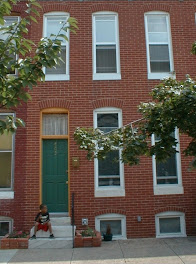By: Raevyn Jones, Marketing Coordinator, NHS of Baltimore
In today’s economy, renters and tenants are now being affected by foreclosure nearly as often as homeowners. The mortgage crises began in 2006 and resulted in millions of Americans losing their homes to foreclosure. Now there are thousands of renters, who without warning, are discovering that there rented house or apartment is now owned by a bank who wants them out because the property is being foreclosed upon.
Many tenants have no clue that their building has been taken at foreclosure. Because of this, they unfortunately continue to pay rent to the former owner who pockets the money but no longer maintains the building since they do not own it. New owners often refuse to make repairs and sometimes fail to pay utility bills. This makes life almost impossible for tenants as long as they are living in the foreclosed property.
Before May 20, 2009, most renters had no rights and lost their leases upon foreclosure. However, this changed when President Obama signed the “Protecting Tenants at Foreclosure Act of 2009.” This legislation states that leases would survive a foreclosure, meaning that the tenant could stay at least until the end of the lease and that month-to-month tenants would be entitled to 90 days. This protection law applies to Section 8 tenants as well.
A tenant who holds a lease and has to move out so that new tenants can move in may opt to sue their former landlord in small claims court. This is possible because after the lease is signed, the landlord is legally bound to deliver the rental for the entire lease term. When a landlord defaults on a mortgage, which sets in motion the loss of a lease, the tenant can sue for the damages it causes.
Today when a rental home is being foreclosed, tenants no longer have to feel like they are between a rock and a hard place. Due to these new rights, being a tenant in a foreclosed home does not mean you are instantly out on the street. There are also other resources that these tenants can utilize for help in these situations. Tenants can speak with a HUD certified housing counselor who will offer responsible, quality advice at no charge. For general information or referrals, tenants can contact the Baltimore Neighborhoods, Inc. Tenant- Landloard Hotline.
Wednesday, July 28, 2010
Thursday, July 8, 2010
Maryland’s Homestead Tax Credit
By: Sunny Cooper, Special Projects Manager, NHS of Baltimore
The homestead tax credit is a program brought on to help homeowners deal with large assessment on their main residence. The way the homestead tax credit works is that it limits the increase in taxable assessments each year to a fixed percentage. According to state law, every county and municipality is required to limit taxable assessment increases to 10% or less each year. Taxpayers should make sure they are aware of the homestead caps for each local government.
This tax credit does not limit the market value of the property as determined by the Department of Assessments and Taxation. It is a credit calculating on any assessment increase exceeding 10% (or the lower cap enacted by the local governments) from one year to the next. The credit is calculated based on the 10% limit for purposes of the State property tax, and 10% or less (as determined by local governments) for purposes of local taxation. In other words, the homeowner pays no property tax on the market value increase which is above the limit.
Taxpayers who wish to receive the homestead tax credit, should also be mindful of the new application requirements. This tax credit requires that all homeowners submit to a one-time application to establish eligibility for the credit. The application form will be in an assessment notice mailed to a third of the homeowners at the end of December for the next three years. New purchasers of residential properties will also receive this form.
The homestead tax credit will only be granted if certain conditions were meant during the previous tax year. Conditions include that the property must not have been transferred to new ownership, there had been no change in the zoning classification requested by the homeowner resulting in an increased value of the property, and the previous assessment was not clearly erroneous. A further condition is that the dwelling must be the owner’s principal residence and the owner must have lived in it for at least six months of the year, including July 1 of the year for which the credit is applicable, unless the owner was temporarily unable to do so by reason of illness or need of special care. An owner can receive a credit only on one property---the principal residence.
If you have been denied the homestead tax credit, you may appeal the decision if you feel that you are eligible. To appeal you must contact the Central Office for the Homestead Tax Credit Program. A final denial of a Homestead Tax Credit by the Central Office may be appealed within 30 days to the Property Tax Assessment Appeal Board in the jurisdiction where the property is located.
The homestead tax credit is a program brought on to help homeowners deal with large assessment on their main residence. The way the homestead tax credit works is that it limits the increase in taxable assessments each year to a fixed percentage. According to state law, every county and municipality is required to limit taxable assessment increases to 10% or less each year. Taxpayers should make sure they are aware of the homestead caps for each local government.
This tax credit does not limit the market value of the property as determined by the Department of Assessments and Taxation. It is a credit calculating on any assessment increase exceeding 10% (or the lower cap enacted by the local governments) from one year to the next. The credit is calculated based on the 10% limit for purposes of the State property tax, and 10% or less (as determined by local governments) for purposes of local taxation. In other words, the homeowner pays no property tax on the market value increase which is above the limit.
Taxpayers who wish to receive the homestead tax credit, should also be mindful of the new application requirements. This tax credit requires that all homeowners submit to a one-time application to establish eligibility for the credit. The application form will be in an assessment notice mailed to a third of the homeowners at the end of December for the next three years. New purchasers of residential properties will also receive this form.
The homestead tax credit will only be granted if certain conditions were meant during the previous tax year. Conditions include that the property must not have been transferred to new ownership, there had been no change in the zoning classification requested by the homeowner resulting in an increased value of the property, and the previous assessment was not clearly erroneous. A further condition is that the dwelling must be the owner’s principal residence and the owner must have lived in it for at least six months of the year, including July 1 of the year for which the credit is applicable, unless the owner was temporarily unable to do so by reason of illness or need of special care. An owner can receive a credit only on one property---the principal residence.
If you have been denied the homestead tax credit, you may appeal the decision if you feel that you are eligible. To appeal you must contact the Central Office for the Homestead Tax Credit Program. A final denial of a Homestead Tax Credit by the Central Office may be appealed within 30 days to the Property Tax Assessment Appeal Board in the jurisdiction where the property is located.
Subscribe to:
Posts (Atom)




+for+blog.jpg)
.jpg)
